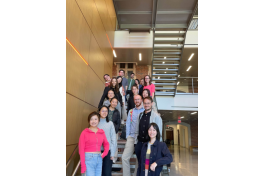
As a top-ranked research program, the School of Communication maintains multiple research groups and labs focused on different topics, such as communication, opinion and political studies, and media entertainment and media effects. A newer addition to the groups is the Computational and Statistical Models (COSMOS) group, which brings together faculty members and graduate students with an interest in using advanced computational and statistical methods to address various communication questions.
COSMOS taps into the field of data science, which involves using techniques like data mining, machine learning and statistics to understand and gain insights from large sets of data. These analytic techniques help uncover patterns and trends in areas such as linguistics, media studies and social network analysis that can drive innovation and informed decision-making across various industries.
One of the group's main interests lies in utilizing digital trace data, such as information gathered from social media platforms like Twitter/X or mobile tracking data, to understand human behavior in various contexts. This includes seeking support and health information, engaging with news and information online, and analyzing communication patterns in romantic relationships.
Established two years ago, COSMOS is led by three faculty members: Associate Professor Robert Bond, Associate Professor Jingbo Meng and Assistant Professor Mimi Brinberg. The group meets regularly in a dedicated lab within the university campus to discuss ongoing research projects and exchange ideas. This interdisciplinary approach fosters insightful discussions and feedback among members, contributing to the advancement of research in the field.
The COSMOS group organized an inaugural mini-conference on April 12 and 13 at the Translational Data Analytics Institute. The conference focused on using computational methods to tackle challenges in the field and investigate research problems in political, health and science communication.
The conference featured leading scholars from both the U.S. and international academic communities and welcomed attendees from the School of Communication, Departments of Political Science, Sociology and Psychology at Ohio State.
Funding for the conference was provided by the School, along with contributions from the group's research funds. Additionally, the conference served as an opportunity to showcase the work of the COSMOS group to a broader audience and establish collaborations with other institutions.
While the COSMOS group aims to keep its focus on scholars with an interest in computational methods, it also seeks to expand its reach and influence within the academic community. The group looks forward to continuing to take novel computational approaches to tackle communication problems that have real-world impact.
Article by student Emily Swenson
